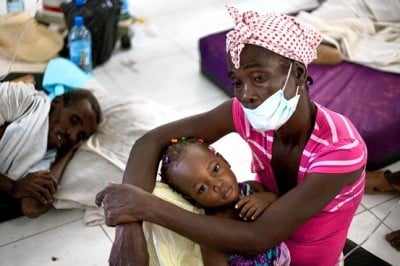UN Finally Offers ‘Half Apology’ to Haiti for Cholera Outbreak
Six years after peacekeepers unleashed a devastating Cholera outbreak in Haiti, the UN admits "moral" responsibility and offers a "half apology."

After six years of refusing to accept full responsibility for causing a deadly Cholera outbreak in Haiti which has killed up to 30, 000 people since 2010, U.N. Secretary-General Ban Ki-moon finally offered what he suggested was an official apology on Thursday.
Speaking at a special meeting of the U.N. General Assembly in New York, he addressed his remarks directly to the Haitian people in Creole and French. “We apologize to the Haitian people. We simply did not do enough with regard to the cholera outbreak and its spread in Haiti. We are profoundly sorry for our role,” said Ban.
While in August a U.N. spokesperson had admitted the organization needed to “do much more” to address its role in the deadly outbreak – a statement which the U.N.’s own special rapporteur on extreme poverty and human rights said was a “disgrace” – this is the first time the secretary-general himself has offered an explicit apology.
Ban added that the U.N. role in the epidemic
“leaves a blemish on the reputation of U.N. peacekeeping and the organization worldwide. For the sake of the Haitian people, but also for the sake of the United Nations itself, we have a moral responsibility to act and a collective responsibility to deliver.”
While Ban’s statement did accept “moral” responsibility, it was careful to avoid any admission of legal liability.
U.N. Special Rapporteur on Extreme Poverty and Human Rights Philip Alston slammed the statement, calling it a “half apology”. Alston told the Guardian that the ” determination not to accept legal responsibility entrenches a scandalous legal maneuver designed to sidestep the U.N.’s legal obligations,” adding that “it renders a meaningful apology impossible, as is made clear by the half-apology of the secretary-general today: he apologizes that the U.N. has not done more to eradicate cholera, but not for causing the disease in the first place,” he concluded.
The cholera epidemic first struck Haiti in October 2010, less than one year after the disastrous earthquake that worsened longstanding poverty and instability. The first people affected by the outbreak lived near a U.N. base housing over 450 peacekeepers, recently transferred from Nepal where cholera was already an issue. Multiple studies identified the peacekeepers as ground zero for the epidemic which has since spread throughout the Caribbean.
Haiti’s representative to the U.N., Jean Cazeau, said “The U.N. has shown it can admit making mistakes,” adding that the statement represents “a radical change of attitude away from the morally unjustifiable approach from the U.N. until now.”
Brian Concannon, executive director of the Institute for Justice and Democracy in Haiti, said, “Haitians are looking for a less qualified apology – for both introducing cholera and for the six years of denial of responsibility, which was an insult to Haitian dignity.”
While sidestepping legal responsibility and thus the financial liabilities that come with it, Ban reiterated his plan to raise US$400 million over the next 3 years to combat the epidemic and redress some of the damages wrought on the region.

